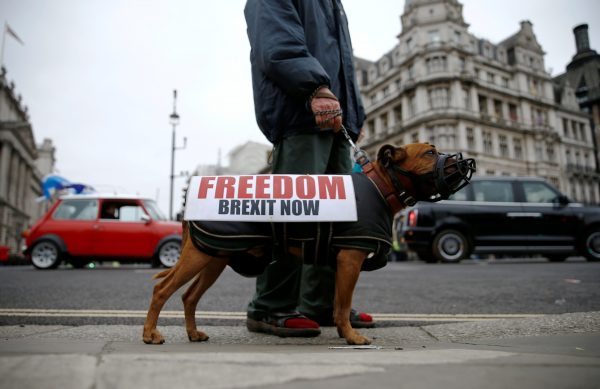How much trade, investment and movement of people are to be allowed between the United Kingdom and Europe is yet to be negotiated. And what the British do with their newfound trade-policy and regulatory freedom is far from certain. But the uncertainty around whether Brexit will occur is over and there will be more policy bandwidth to deal with other issues.
If there’s one thing clear in international economics, it’s that gravity matters: distance and size are the strongest determinants of international trade. The closer two countries are, and the larger they are, the more they trade. Pushing against gravity will be the new norm in post-Brexit Britain as it looks afar for new trade and investment links.
The United Kingdom is smaller and weaker because of Brexit and starts negotiating with Brussels with little leverage, no matter what Prime Minister Boris Johnson says.
As David Vines reminds us in this week’s feature piece, ‘Britain wants to continue the unimpeded access to European markets which it possessed in the Single Market’. But this will only be possible if Britain subscribes to ‘the freedoms and standards coming from the Single Market’. The four freedoms are the freedom of movement of all goods, capital, services, and labour. It is difficult to see the European Union allowing Britain to pick and choose the standards and freedoms it wants without compromising the European experiment. Brussels will be careful to avoid setting a precedent for other nationalist, separatist movements across Europe.
What sort of economic agreements London can negotiate with other partners is also far from certain. It is difficult to imagine that a Britain that has shrunk itself away from its huge neighbour is going to be embracing liberal policies and openness.
Negotiating deals with the world’s two largest economies — China and the United States — will be far from easy. The United States is imposing lopsided deals on countries big and small, including damaging provisions outside of the existing rules. In some instances Washington is forcing countries to pick sides. In the new North American trade agreement, the USMCA, Canada and Mexico had to swallow a poison pill provision that says the United States can walk away from the agreement if either start negotiating with a non-market economy (read: China).
Doing a deal with China may be easier but involves agreeing to standards that are not consistent with the other deals on the UK’s agenda. Judging by the debate around the decision to allow Chinese tech-giant Huawei into the UK’s 5G telecoms network, there will be pressure from the United States and within London to limit engagement with China.
How about countries like Australia that are chomping at the bit to do a deal with its old Commonwealth master? The battle lines are becoming clear as farmers in the United Kingdom insist they will resist letting in Australian beef, sugar and lamb. And Australia will be focussed on its deal with the European Union — a much bigger prize. Sentiment and history will not count for much when vested interests dig trenches across the negotiating table.
High on the priority list is to join the Trans-Pacific Partnership agreement, minus the United States. Another should be the Regional Comprehensive Economic Partnership (RCEP) agreement. These agreements are centred in Asia, on the other side of the world. Britain will be competing with a larger Europe that continues to sign major deals in Asia and will be impeded in the battle for markets by distance and lack of size.
Many place trust and hope in a proactive, global Britain after it puts its messy divorce settlement with the European Union behind it. An agile foreign policy and open British economy would inject some much needed leadership into global affairs. But the evidence points towards a Britain that continues its retreat from globalisation and carries much less global weight.
The chances are that Britain continues to look inward except for politically-driven trade deals with like-minded countries on the other side of the world. Little wonder that a once-unthinkable united Ireland is now a possibility. And Scottish independence has regained momentum.
The British people made a huge choice in 2016 to exit the European Union. Delivering that decision has taken almost four years and it’s still not clear what the divorce settlement looks like. Britain now faces a new choice for its future direction and orientation. This next choice will take longer to materialise and will be more than a one-shot deal. Clarity of purpose, strategic thinking and deft diplomacy will be needed, characteristics that may have once defined Britain but now seem to be in short supply.
Britain will be looking East to the dynamic East Asian economy and it will be up to us to extract the best out of British strategy. It doesn’t seem there are too many other places that will.
The EAF Editorial Board is located in the Crawford School of Public Policy, College of Asia and the Pacific, The Australian National University.

